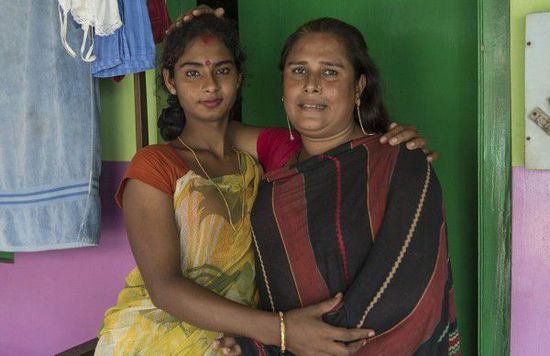Asia: Banyan: Knife-edge lives
亞洲:榕樹:刀口余生
The effects of discrimination against transgender Asians are huge, if hidden.
在亞洲,變性人遭受嚴重歧視,卻鮮為人知
It's a matter of survival, one Indian transgender woman explains: never make eye contact with anyone potentially threatening.
對于那些可能危及你安全的人,眼神交流都該避免,一位印度的變性女性解釋道,因為性命攸關。
Yet in the warren of alleys, workshops and tenements that is Old Delhi, Mallika, with a defiant gleam, is having none of it.
然而,對于生活在舊德里的Malika來說,無論是巷陌鬧市、工坊商店還是簡陋公寓,盡管眼里閃爍著一絲不甘,她可真的與路人毫無眼神交流了。

Until recently neighbours used to mock her and denounce her as a danger to their children.
不久前,鄰居還奚落,甚至告發Malika,認為她威脅到了他們的孩子。
With police connivance, they pressured her to leave.
在警察的默許之下,鄰居甚至逼迫她Malika搬家。
But then SPACE, an NGO working with transgender people, took up her cause.
還好,致力于幫助變性人的非政府組織SPACE隨后幫Malika解了圍。
It taught Mallika her rights, and engaged the whole area in discussions, warning neighbours as well as the police that discrimination against trans or “third gender” people was illegal, and that prosecutions and fines would follow.
它讓Malika明白自身的權利,組織整個社區一同協商,警告鄰居和警察——歧視變性人和“第三性”人可是違法的,將面臨起訴與罰款。
Now, Mallika says, her street has stopped mocking her, and she can go about “full of attitude”.
Mallika說,現在街坊都不敢再奚落她了,而她也終于可以“昂首挺胸”地上街了。
“It’s them who don’t dare look at me,” she boasts.
她得意地說,“現在可是他們不敢正眼看我了。”
There are 9m-9.5m transgender people in Asia and the Pacific, according to an estimate by Sam Winter of Curtin University in Australia, equivalent to 0.3% of the population.
根據澳大利亞科廷大學的山姆·溫特估計,約有900-950萬變性人生活在亞太地區,占人口總數的0.3%。
Others say the figures could be much higher.
一些人認為,可能還不止這個數。
In some countries, in some respects, their life is getting better.
在一些國家,變性人在某些方面的確生活得越來越好。
Courts or governments in Bangladesh, India, Nepal and Pakistan have all recognised transgender people as a legal category and defended their rights to a certain extent.
孟加拉國、印度、尼泊爾和巴基斯坦都承認了變性人的法律地位,并且在一定程度上保護他們的權利。
A group of Muslim clerics in Pakistan recently declared that it was haram to persecute them.
在巴基斯坦,一群穆斯林教士宣稱,迫害變性人是一種暴行。
Singapore has allowed hospitals to perform sex changes since the 1970s and formally legalised trans marriages (although not gay ones) in 1996.
而新加坡自20世紀70年代就允許人們去醫院接受變性手術,并且在1996年就認可變性婚姻(盡管同性戀婚姻還是違法)。
Yet discrimination remains horrific.
然而,變性人仍面臨著十分嚴重的歧視。
Transgender people are often the targets of violence, as a UNDP report highlighted last year.
去年,一份UNDP的報告曾明確指出,變性人經常遭受暴力迫害。
In China, the attackers are often relatives of the victim.
在中國,施暴者多為受害人的親屬。
One survey in Australia reported that three-fifths of trans men (ie, people who were deemed female at birth but now identify as male) suffer abuse from their partners.
一份澳大利亞調查指出,五分之三的變性人(比如出生時是女性現在變性為了男性)遭受伴侶虐待。
And in Fiji 40% of trans women have been raped.
在斐濟,40%變性女性曾遭受強暴。
School dropout rates are invariably high, with an 85% rate among trans girls at secondary school surveyed in Vietnam.
變性人的輟學率一直居高不下。據調查顯示,在越南,85%的變性女孩于中學輟學。
There are problems of getting work even in relatively tolerant societies: in Hong Kong, trans people have an unemployment rate four times the territory’s average.
即使在對變性人相對包容的社會,變性人仍然很難找到工作。在香港,變性人失業率是地區平均值的四倍。
Trans people are often stressed and suffer high levels of mental ill-health, yet the stigma makes it hard for them to find help.
變性人大多飽受嚴重心理疾病折磨,但在社會偏見的影響下,他們很難向外界尋求幫助。
Some resort to selling sex, making them vulnerable to arrest, violence and disease.
一些變性人走投無路之下只好從事性工作,可這卻讓他們更容易被逮捕,遭受暴力騷擾和感染疾病。
(Almost a quarter of trans sex workers surveyed in Port Moresby, the capital of Papua New Guinea, were HIV positive. )
譬如,在巴布亞新幾內亞的首都莫爾斯比港,四分之一的受訪性工作者感染了艾滋病。
Trans people are often targeted for harassment by the authorities under public-nuisance and vagrancy laws, too.
政府人員常常以妨害公共利益罪和流浪罪之名找變性人的麻煩。
If jailed, they are often beaten up by fellow prisoners.
變性人一旦入獄,他們經常會遭到其他獄犯拳腳相向。
All this is despite long traditions of relative tolerance for transgender people in many Asian countries.
盡管在許多亞洲國家存在著對變性人相對包容的悠久傳統。
In India, for instance, hijras, a category of men who dress as women, many of them castrated, have a certain standing.
譬如,在印度,有一群打扮如女性的男性群體海吉拉斯,他們大多都接受過閹割,在社會上有一定地位。
They are thought to derive spiritual power from their sexual status, and so can bestow blessings or curses.
人們認為他們能從其性別身份獲得精神力量,從而賦予他人祝福或詛咒。
They sing and dance at weddings. Failure to pay for their (often unbidden) attendance risks misfortune.
他們常在婚禮上又唱又跳,雖然經常不請自來,但如果主人不給他們出場費,那可就有可能因此而遭受不幸。


